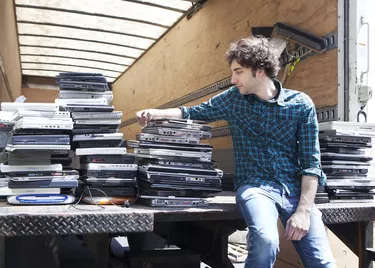
Nearly 4.3 billion smartphones, 1.4 billion computers and at least one billion televisions are in use worldwide. According to a United Nations report, our consumption of electronic devices and gadgets results in over 50 million tons of electronic waste (e-waste) per year. Only 20 percent of that material is recycled.
Many of your old electronics can be recycled or find a second life that doesn't include ending up in a landfill.
Video of the Day
Video of the Day
What Is in E-Waste?
The World Economic Forum defines e-waste as anything with a plug, electronic cord or battery that has reached the end of its lifespan. E-waste comes from small electronic products, like cell phones and laptops and larger items, like televisions, computer equipment and appliances.
E-waste contains more than plastic. There are valuable raw materials – and toxic chemicals – in electronic waste. The American Chemical Society estimates the waste from cell phones alone to contain 45 percent carbon-based plastics, 35 percent metal and 20 percent glass and ceramic.
The World Economic Forum breaks that down into precious metals and valuable materials, such as gold, nickel and copper. There are also heavy metals, like chromium and cadmium. Batteries in electronics may contain lithium, cadmium, lead, zinc or mercury. Up to 60 elements from the periodic table can exist in an old electronic device.
Large appliances tend to get hauled off when consumers replace them, but nearly 75 percent of all devices and gadgets are stowed in a forgotten drawer or corner, and 4 percent get put into the waste bin. It is estimated that over 150 million old cell phones are dumped in landfills each year.
Add to that the waste and emissions involved in manufacturing electronics and the illegal processing of some e-waste and its toxic materials. You begin to see why the World Health Organization calls this surging waste stream a growing global threat.
What Can You Do About E-Waste?
Keeping old electronic equipment out of the landfill starts long before the local recycling program. Look for sustainability in your ownership of electronic devices. When choosing a new device, you can opt for a product with longevity – and repairability – rather than taking home a throwaway. Look for manufacturers who pledge to reduce carbon emissions and use recyclable parts.
The manufacturers of many electronic devices resist making their devices widely repairable, citing dangers to intellectual property and consumer protection as the reasoning. A growing movement called Right to Repair is working to make repair more accessible. The Right to Repair website also has a tool to help you find local repair businesses that can fix your broken electronics.
When it's genuinely time to ditch your old mobile phone or laptop, whatever you do, don't toss it in the garbage bin or put it in a dusty corner of the garage. Those are the wrong ways to take care of e-waste. There are several right ways.
Electronic Recycling and Reuse
When an electronic item is on the way out of your household, if it's not something you can sell to a third party or trade in for credit toward your purchase, you may be able to donate directly through a retailer. The Environmental Protection Agency lists places you can donate or recycle old electronics.
Or explore to find a second use for an old device on your own. Nonprofit organizations like human-i-t and Secure the Call help tackle e-waste and bridge the digital divide by collecting and distributing old electronics.
By donating your laptop or cell phone, you keep e-waste out of landfills and put technology in the hands of someone who needs it. But don't leave devices tucked away in a drawer for years before you decide to donate them. Get it into recirculation as soon as possible. You may even end up with a tax deduction for it.
Another option is to contact your local waste management company or village office and learn about recycling programs and collection events in your community.
Don't wait until Earth Day to take action against e-waste. You have the ability to help keep electronic devices – and other recyclable waste – out of landfills.
- Federal Trade Commission (FTC): Nixing the Fix
- Repair.og: This Is Your Right to Repair
- White House: Executive Order on Promoting Competition in the American Economy
- Environmental Protection Agency (EPA): Electronics Recycling and Donation
- Consumer Reports: How to Recycle Electronics
- U.S. Public Interest Research Group (PIRG): Cleaning out your drawer of old electronics? Here’s what to do.
- Best Buy: Electronics, Appliances and Fitness Equipment Recycling at Best Buy
- Secure the Call: Recycling Cell Phones for Seniors
- American Chemical Society (ACS): Listen Up! The Life Cycle of a Cell Phone
- United Nations (UN): Report: Time to Seize Opportunity, Tackle Challenge of E-waste